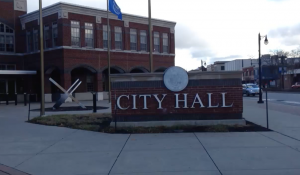by Zach Wilmes.
ST. LOUIS – America’s fascination with Sarah Palin was on full display at Thursday night’s much anticipated vice presidential debate at Washington University between the Alaska governor and Sen. Joseph Biden.
And while vice presidential debates have historically held little significance to voters, Thursday night’s performance could well change things this time around.
“If you were undecided, this debate could’ve changed that, probably more so than any presidential debate will,” said Brett Plazek, a 26-year-old project engineer in Sioux City, Iowa, a battleground state.
“I probably wouldn’t be paying too much attention to the VP debate if Palin wasn’t running,” he said. “For the most part, I think [VP debates] are useless, but this time I think it could definitely make a difference.”
Plazek, who said everyone he knows has taken an interest in this year’s election race, isn’t alone. Students and professionals alike confessed they watched the debate out of curiosity about Palin more than any other reason.
“We’re still trying to find out who Sarah Palin is,” said Aaron Silc, a 24-year-old accounts manager for a design firm in Chicago. “The importance of the debate was getting acquainted with the candidates.”
Silc said he thought Palin didn’t articulate a strong position on anything, sticking to the script and reiterating McCain‘s reputation as a maverick senator instead.
“The talking point express was on a roll,” he said.
That didn’t bother Douglas Holtz-Eakin, a senior policy adviser to the McCain campaign who talked with reporters in “spin alley” minutes after the debate ended.
Holtz-Eakin said every time Palin makes an appearance her popularity soars.
“This is clearly historic,” Holtz-Eakin said. Voters “are gonna love it!”
Jason Young, a 26-year-old lumber salesman in Titusville, Fla., isn’t so sure.
“I don’t think it will change too many people’s minds,” the former Chicagoan said. “Aside from crying, there’s not much she can do to make herself look worse.”
Palin has certainly drawn a lot of attention, but not everyone is as enthusiastic about the Republican vice presidential candidate as Holtz-Eakin.
Patrick Callahan, a political science professor at DePaul University, likens the media circus surrounding Palin to “taunting a caged moose.” And last week’s debate was the show under the big tent.
Debates can be “harmful to the rationality of our election process,” Callahan said. If the debate has any lasting impact on our society, it may serve, “to increase the level of cynicism about American politics, if that’s at all possible.”
“It’s the ugliest thing in politics I can remember since people found out that McGovern’s running mate [Senator Thomas Eagleton ] was hospitalized for depression,” said Callahan, referring to McGovern’s 1972 White House bid in which Eagleton was forced to step down.
When the focus of the debate is on the candidates rather than the issues, the results can be damaging, said Callahan.
Callahan argues that debates, in theory, are a good idea. But unless both candidates agree on to use the debates solely as a forum for discussing their ideas, then the risk of the debate degenerating into a political sideshow is great.
Debates are biased against those who are less proficient speakers, he said. Once candidates start losing, Callahan said, they will always try to move the debate in a direction they’re more comfortable with, not one that answers the questions people need to know.
No matter which candidate ultimately becomes vice president, it’s still unclear exactly how much power he or she will have in the administration, thanks in large part to the ambiguity of the job.
“Constitutionally, there’s not much of a role,” said Michael Desch, a professor of political science at University of Notre Dame. It’s really up to the president how much responsibility they want to delegate. Bush was happy to let current Vice President Dick Cheney make many of the important decisions, he added.
Palin’s chances of having “any influence on the foreign or defense policy decisions of a McCain administration, should there be one, are about equal to the chances of Bob Barr getting elected,” said Callahan, referring to the former Georgia congressman running as the Libertarian’s presidential candidate.
As John Nance Garner, Franklin D. Roosevelt‘s vice president, famously said, “The vice presidency is not worth a bucket of warm spit.”
This election just may prove him wrong.

![Reblog this post [with Zemanta]](http://img.zemanta.com/reblog_e.png?x-id=a29f2091-c06d-4fce-89f9-8b5e21fa4c44)





Be First to Comment